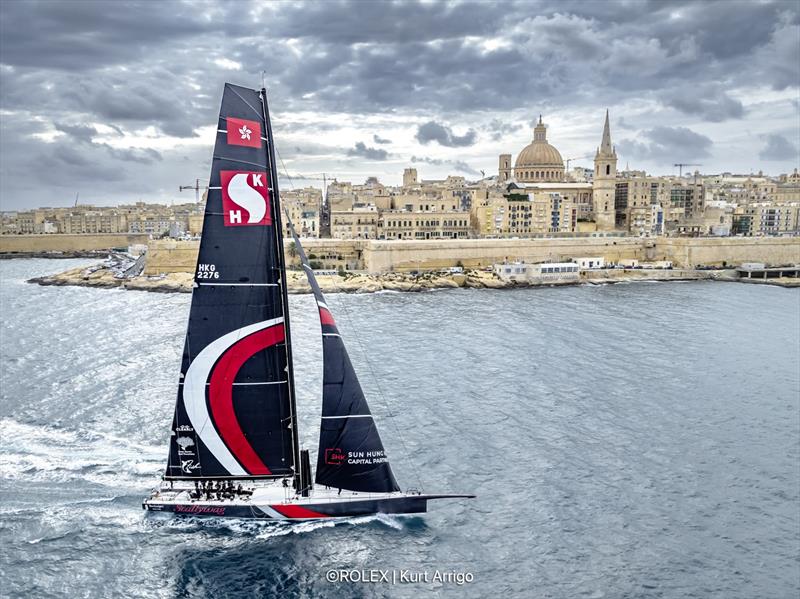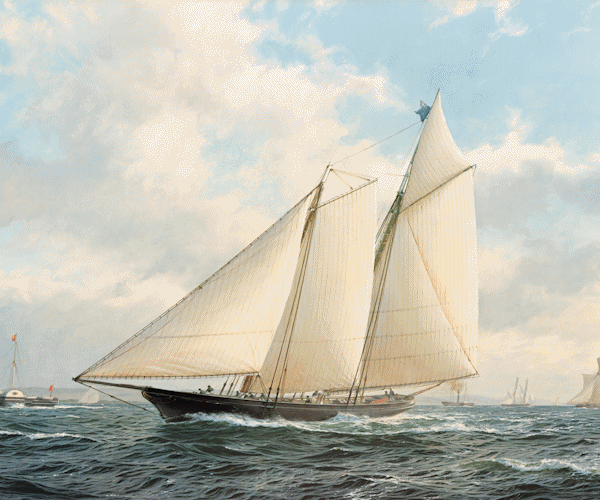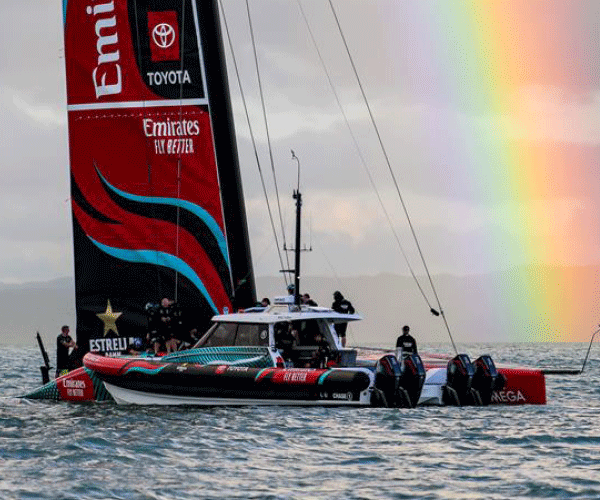
Scallywag Reigns Supreme in the 45th Rolex Middle Sea Race
by Rolex Middle Sea Race Media 22 Oct 11:43 PDT
22 October 2024

Line honors for Scallywag 100 in the 45th Rolex Middle Sea Race © Rolex / Kurt Arrigo


After a fluctuating 48 hours, the Rolex Middle Sea Race gained momentum overnight as the leading yachts caught the fresh southerly wind blowing from Malta toward the Strait of Sicily.
The outcome for those boats that passed Favignana yesterday afternoon was a solid, stable breeze at last. For Seng Huang Lee’s Scallywag 100 from Hong Kong, this wind was just what was needed to secure a hard-fought Line Honours victory. The crew crossed the finish line of the 2024 Rolex Middle Sea Race at 09:43:29 CEST on Tuesday morning, finishing with a time of two days, 21 hours, 33 minutes, and 29 seconds. If only it had been that simple.
So far, four yachts have completed the race. Black Jack 100 finished second, 18 minutes behind. After a fierce battle, Remon Vos’ 100ft entry was ultimately outpaced on the penultimate leg from Lampedusa to the South Comino Channel. Bryon Ehrhart’s 88ft/27m Lucky crossed the finish line 30 minutes later, a redemptive performance following last year’s retirement. Balthasar came in fourth, with the disadvantage of the Maxi72’s waterline length becoming evident as the larger competitors thrived on the open water legs. Balthasar currently leads provisional IRC 1 after time correction, as well as the overall leaderboard for the moment. The next group of finishers is expected around midnight, and the race is intensifying for those targeting victory.
“I’m incredibly proud of the team. This is one of the toughest races I’ve tackled in a 100-footer,” expressed a clearly relieved David Witt soon after docking at Marsamxett Harbour, home to the Royal Malta Yacht Club. “We faced 40-knot rain squalls, trying to keep the boat intact and upright. There were 90-degree wind shifts and glassed-out conditions. We made more sail changes than anyone else, and the guys executed flawlessly.”
Tristan Le Brun, the racing skipper of Black Jack, appeared disappointed but philosophical about the defeat. He quickly extended his congratulations to the victors. “Kudos to Scallywag; this time it was their moment,” he remarked. “Scallywag was very competitive. We were quite impressed. They entered the race well-prepared, the boat was performing excellently, their sail changes were quick, and their navigation was spot on, all of which made things tough for us.”
The two boats were neck and neck for a significant portion of the race, as the course splits reveal:
Capo Passero: Black Jack by 14 minutes; Messina: Black Jack by 58 mins; Stromboli: Black Jack by 15mins; Favignana: Scallywag by 14 mins; Pantelleria: Black Jack by 22 mins; Lampedusa: Black Jack by 16 mins; Finish: Scallywag by 18 mins.
In a race characterized by numerous halts and shifts, Scallywag’s turning point came with 110 nautical miles left. David Witt explains: “In terms of critical decisions, many choices could have cost us the race, but the pivotal moment was rounding Lampedusa. I thought we would tack, but Juan (Vila) pointed to a cloud and asserted: ‘We’re heading there.’ He insisted: ‘We’ll sail into the cloud; it may seem awful, but we’ll come out on the other tack at a 30-degree advantage, and we’ll have a chance.’ When Juan Vila speaks, you follow his lead.”
One of Scallywag’s best decisions prior to the race was hiring Vila as navigator, Witt confirmed: “What a decision to bring him on board for this race. We’d still be out there without him. Black Jack’s strategy at Lampedusa was wise; while they chose to tack away from the cloud, Juan’s judgment was remarkable, and we were fortunate to have him as our navigator. He’s a legend.”
Vila, a former round-the-world race champion from Spain, suggested that this crucial decision was more of a calculated risk. “The Rolex Middle Sea Race is typically challenging. It’s always complex,” he stated. “We had to constantly anticipate the wind. It was a very intense race. The last chance at Lampedusa to diverge from Black Jack was critical. We had to take a chance, and it turned out well for us.”
His crewmates would argue that luck had little to do with it. “Before we rounded the island, Juan came up on deck and pointed out: ‘There’s a cloud to the south. We’ll sail through that before tacking.’ You never sail into clouds. We did, got soaked, but it worked. I’ve never seen anything like it,” said Pete Cumming, who was part of the MOD70 Argo when it set the outright race record in 2021.
Clearly, Vila is a mariner worth listening to. “This is likely one of the toughest races I’ve had to navigate,” he noted. “It was relentless, constantly changing, with much to consider, and the weather models often incorrect. There were tons of variables and critical moments to get right.” Vila also complimented the competition: “Black Jack is a formidable boat with an excellent crew. They performed exceptionally, and without our last opportunity, they would have aced this race. They strategized brilliantly. Both teams did their utmost to stay safe when leading and sought out chances when trailing.” Vila candidly admitted that they benefited from having Black Jack marginally ahead at the course’s bottom. “It turned out to our advantage. We managed to catch the shift from the northeast to the southeast, positioning ourselves windward of Black Jack—albeit slightly behind—yet in a good spot to harness speed. Had we been on our own, we would have acted like Black Jack. Being behind can often be advantageous when looking for a split opportunity.”
The Black Jack crew was aware during the halfway point at Favignana that they needed a remarkable performance in the remaining 300 miles. It wasn’t going to be simple and was, frankly, in the hands of fate. Southeast winds were expected in the remaining course, and this angle would benefit a powerful reaching Maxi like Scallywag. “Sailing south, we were completely calculated and in control,” explained Le Brun. “Ideally, we would have extended our lead since we knew that toward the finish, upwind sailing in 20 knots plays to Scallywag’s strengths. They simply have a speed advantage. Their tactical move at Lampedusa was smart. We believed they executed perfectly. We didn’t have the necessary gap, tried a different route, and gambled with luck, but it didn’t pan out.”
For Witt, the opportunity identified by Vila was all Scallywag needed. “Scallywag never gives in, and we desperately required this result,” he said. “Once we sensed a chance, everyone went all in. Black Jack sailed brilliantly. They executed exceptionally. Our luck was that we never conceded.”
The Scallywag team’s expressions reflected that this victory was more than just a race win. The yacht underwent a significant refit in 2023, and during its first major outing at the Rolex Sydney Hobart last December, it retired after its bowsprit broke. This race presented a chance to validate the initial and ongoing efforts. “This outcome validates everything,” Witt asserted. “We believed we had the right package, but you can’t tell until you see results. This race is incredibly prestigious and fantastic, and we look forward to participating again.”
Despite the evident frustrations of often holding the lead but not executing successfully, Le Brun was quick to commend owner Remon Vos and the crew for an admirable effort. “Ultimately, this is a team sport, and that’s the most crucial aspect,” he remarked. “We made a great team before the race, during it, and now, we are a strong team even if we didn’t finish where we wished. In this race, unpredictability abounds, and a good team consistently seeks solutions and supports each other in rectifying mistakes.” Black Jack is undoubtedly more than just a strong team.
Following Lucky’s third-place finish, Balthasar, helmed by Louis Balcaen, concluded the Rolex Middle Sea Race with an elapsed time of three days, one hour, 30 minutes, and 25 seconds, currently leading the provisional leaderboard after IRC time correction. While a lot remains in this race, the crew felt understandably pleased with their performance. “Balthasar is a family project; the idea is to blend my friends who are amateurs with professional sailors like Bouwe Bekking,” shared Louis Balcaen. “The first night was somewhat chaotic; we were caught by a thunderstorm while downwind with the kite up, which was tricky to douse. We conducted thorough research before acquiring the Mark Mills design and refitted it to participate in both offshore and inshore events. This served as our first significant challenge, and the boat performed incredibly well—it’s very durable.”
Watch Captain Stu Bannatyne has participated in eight round-the-world competitions, winning four. “This was a classic Rolex Middle Sea Race, where decisions could lead to substantial gains or losses,” he noted. “Upon reaching Messina, we enjoyed a nice breeze, allowing us to stay close to the larger Maxis, which was motivating.” The race became trickier between Stromboli and Favignana: “We lost contact with the leading duo, who sped ahead in the breeze, while smaller boats caught up behind us, which was frustrating. It’s the nature of this race.” Their response was to dig deep and persevere. “We managed to catch up with Lucky a couple of times. We didn’t quite pass them, but it was motivating. We pushed hard until the end.”
More yachts are expected to finish overnight, and by tomorrow evening, we should have a clearer view of the contenders for overall victory under IRC time correction. However, today belongs to Scallywag.
Class Action @ 17:00 CEST, Tuesday 22 October
IRC 1
Four boats are in the clubhouse, with Balthasar holding a solid 14-hour lead over Lucky. Scallywag is in third place, while Black Jack is fourth. Three yachts are still racing: the VO 65s have passed Favignana, namely Gerwin Jansen’s Sisi from Austria and Lithuania’s Ambersail 2, owned by Raimundas Daubaras, along with the VO70 Dinzer Doo, led by Mika and Daniel Thomas from the United States, on course to Pantelleria.
IRC 2
An outstanding class battle is ongoing. Jean Pierre Barjon’s Botin 65 Spirit of Lorina leads on the water and is expected to finish before midnight. Nine miles back and in close pursuit are Stefan Jentzsch’s Botin 56 Black Pearl, Carl-Peter Forster’s German TP52 Red Bandit, and Eric de Turckheim’s 54ft Teasing Machine, all engaged in a tight race. Red Bandit is the lowest rated and had nearly a two-hour lead over Teasing Machine at the Lampedusa transit, with Black Pearl an additional hour behind. Franco Niggeler’s Cookson 50 Kuka 3 is slightly detached from this group but was fourth around Lampedusa, only 20 minutes behind Black Pearl.
IRC 3
Once again, it’s Géry Trentesaux’s Sydney 43 Long Courrier that has made the best of a trying situation, escaping the jam that had ensnared her in a dense group after compressing off San Vito lo Capo. Having just rounded Pantelleria, this lowest-rated boat in the class holds a 20-mile advantage over Walter Watermann & Lars Hückstädt’s GP42 X-Day. On IRC time correction at Favignana, with all but four yachts finished, Long Courrier’s lead was 6 hours over Renzo Grotessi’s Swan 42 BeWild and X-Day, which are a further four hours behind. The Farr 45 Sagolo Sportivento remains in contention, only 10 minutes behind X-Day.
IRC 4
Maltese First 45 Elusive 2, crewed by Aaron, Christoph, and Maya Podesta, continues to dominate IRC 4, leading by nearly 4.5 hours after IRC time correction at the Favignana transit. First 53 Yagiza, skippered by Nikki Henderson, maintains second place in class but significantly lags on corrected time despite nearly matching Elusive for speed. Elusive and Yagiza are now pulling away from the remainder of their class after taking advantage of the new wind south of Favignana. Marco & Isacco Cohen’s French MAT 12 Dajenu has executed a solid performance, advancing to third in class according to the tracker.
IRC 5
Seb Ripard and Dan Calascione’s Maltese Farr 30 Calypso retains a considerable lead in IRC 5, though in the light winds observed today and last night, pursuers have been closing the gap. Calypso was the first to round Favignana just after 17:00 and is sailing into a robust southeast wind, likely recovering some of the lost miles. Two teams that went offshore searching for better wind have reaped benefits; the Maltese IMX 40 Geisha, helmed by Stefan Debattista & Sam O’Byrne, is second in class according to the tracker. Kay-Johannes Wrede and Oomke Möller’s German Swan 44 Best Buddies are in third.
IRC 6
It’s been a slow race for boats in IRC 6. Positioned north of Sicily, none have raced over 100 miles in the past 24 hours. Yet, excitement is palpable among the Maltese youth team led by Claudio Bugeja on J/109 JYS Jan, currently ranked first in class per the tracker. Jean Christophe Cascailh’s French Sun Fast 3200 Milou has dropped to second, but only by ten minutes. In third, with cheers for the Jarhead Young Sailors Foundation, is the J/109 Jarhead, captained by Gary Mercieca.
Double Handed Class
The leading double-handers have experienced a rough day, drifting in northern Sicily. The Greek First 36 Marina 21, helmed by Milan Kolacek and Milan Tomek, has cleared San Vito lo Capo and is finally heading south toward the Egadi Islands. The Swan 47, Lazy Duck, skippered by John and Tommy Ripard, trails by 16 miles but seems to be leading under time correction. The Sun Fast 3300 Alquimia, skippered by Francesco Cerina and Matteo Uliassi, is in third.
Class 40
Three of the remaining Class 40s—Mikael Mergui’s Centrakor, Matteo Sericano’s Lucente, and Aurelien Ducroz’s Marvic40—are speeding south toward Pantelleria, with Centrakor enjoying a slight lead. Marie Goulven’s Espoir and Michael Pühse’s Talanta continue slowly progressing and remain just north of the Gulf of Castellammare.
Track the fleet here.
Stay updated on news and stories at the Rolex Middle Sea Race website: www.rolexmiddlesearace.com


